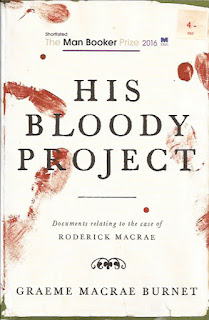Frustratingly, sometimes you will finish a book and be left
with a myriad of questions to mull over. Even more frustratingly, is His Bloody Project, which has left me
with more questions than I dare to count, and a will to read it all over again,
doubting my read of the entire novel and searching online for Macrae’s address
in order to demand a few answers.
The concept is simple yet interesting. In 1869 seventeen
year old Roderick ‘Roddy’ Macrae committed a triple homicide in the Highlands
where he and has family had worked agriculturally. It is not to ruin the
reading of the novel by revealing this, as it is made known from the start. The
story is told through several mediums, commencing with testimony of witnesses,
the memoirs from Roddy, then through the perspective of a psychologist at the
time through to documentation of the trial and newspaper accounts.
Throughout the novel you discover the hardships of croft
life (“there are no other ships for us”) the starvation, the brutality of
Roddy’s depressed father, how family life depended on a small thread, to be cut
at will by bad weather or the whim of the tyrannical brute village constable.
You see the land owners ignorant to how their actions perpetuate the poverty
that they loathe, and how the law at the time was in the stages of infancy and
applied or misapplied at leisure. In this sense it was historically extremely
interesting, and not a period of history I had given much thought to before. I
cannot vouch for the authenticity of the language but it came through as
appropriately archaic without appearing to be a mere literary device and
furthermore it was easily adapted to and did not take away from the story
development.
It is apparent even from the start of the book that it is
not the sort of novel you can pace through – it is not particularly tense or a
page driver. Nonetheless, I still wanted to pick this book up at every
opportunity – I can compare it to a glass of red on a Sunday – not something to
be finished quickly like the gin and tonic after work on a Friday, this is one
of the books you need time to consider and savour or the small significant
details will be missed.
In terms of reality the book was troubling. I had to check
several times, even when reading the account of Roddy if the story were true or
not, despite it clearly being sold as a novel. The writer even testifies at the
end his thanks to historical archives, and some of the psychologists cited are
real people who existed in history. If online accounts are thought to be true,
apparently some book shops have even placed it into the non-fiction sections,
which only serves to attest for the strength of the writing.
Moreover, the format of the novel was an incredibly
interesting concept to the extent that I wish I thought of it first. As a
reader you feel as though you are unravelling the case, or that you yourself
are putting him on trial. It was enjoyable to notice discrepancies in the
accounts, to notice small details first. To counter this, I felt as though the
trial section of the novel was too long and repetitive but wished Roddy’s
account had been longer. I could see the wit that the doctor’s section had but
quickly found it tiresome as it was apparent he could offer no insight as to
whether Roddy was truly mentally insane or psychopathic – or neither.
Furthermore, the conclusion of the novel appeared to me to be anti-climactic.
You discover the verdict of the trial, and then the novel ends without fanfare.
Although this may be the issue with revealing a huge twist in the story, the
murder, at the beginning, perhaps it needed this slow and gentle ending in
order to prevent appearing melodramatic.
Overall I was completely refreshed to read this novel, a
concept unlike anything I have read before and devoid of the usual traps of
modern writing. The writing was memorable and in terms of readability it struck
the perfect balance of historical, archaic language and easy readability and
simplicity. It could have had the possibility of being too bleak, or too dark
as the murderer is the writer of the majority of the novel, and it centres
around hardship and bleakness, however Macrae overcomes this completely. This
would be a complete and total recommendation to any true book lover – if you
are an infrequent reader and need something to propel you through the pages,
this is not it, but if you are looking for something different, then this is
certainly for you.
Spoilers – questions I would ask Graeme Macrae Burnet if I
could find him
·
I didn’t understand the relationship between
Jetta and Lachlan Mackenzie – was it consensual or rape? Her actions towards
him after Roddy’s discovery could have signalled either.
·
What was the secret animosity that lay between
the Macraes and Mackenzies? Was it that Roddy’s mother had slept with Lachlan
as Jetta was referred to in a similar way as Jetta was. Is there a possibility
that Roddy and Jetta are Lachlan Mackenzie’s children?
·
I couldn’t understand the relationship between
Roddy and Archibald Ross, Ross is clearly a complex and ill-meaning character,
but I could not comprehend why he would want to create this relationship?
Wouldn’t class issues have interfered?
·
Why did Mr Sinclair wish to be Roddy’s advocate
so desperately? I could not envisage defendant criminal aid being possible at
the time.
·
Did Jetta really kill herself or did someone
else have a part to play?
·
Ultimately, I don’t think I would want this
question to be answered, but was Roddy a psychopath, mentally ill, or exacting
revenge?

Comments
Post a Comment